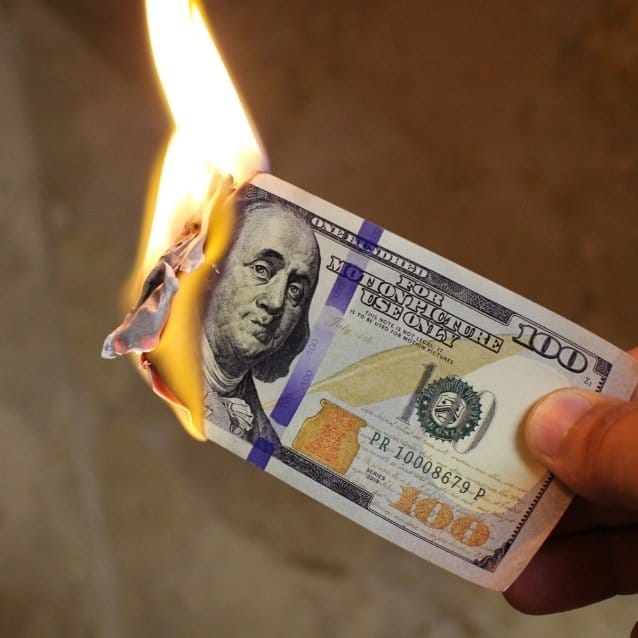In the U.S. alone, as of February 28, 2025, 172,017 employees across various industries were laid off, marking the highest monthly total since July 2020. As a result of these widespread job losses, many individuals are facing job insecurity or unemployment, leading to reduced consumer spending. This decline in purchasing power creates a ripple effect, forcing businesses to downsize further and weakening the overall economy. Given these ongoing challenges, businesses and individuals must adapt to these changes and prepare to navigate potential recessions.

THE MOST HELPFUL ITEM YOU DIDN'T KNOW YOU WOULD NEED IF A RECESSION OCCURS AT THE LATEST BY MID-2025
"Thrive in Any Economic Conditions"
What is Recession?
Recession is a challenging economic situation where there is a decrease in the amount of money circulating in the economy. This decline affects both individuals and businesses, leading to reduced spending, lower profits, and, in some cases, job cuts. As people become more cautious about their finances, they tend to spend less, creating a cycle that impacts various aspects of the economy. During a recession, governments and economists work to find solutions to stimulate spending, investment, and job creation, aiming to break the cycle and restore economic stability.
What is Recession?
Recession is a challenging economic situation where there is a decrease in the amount of money circulating in the economy. This decline affects both individuals and businesses, leading to reduced spending, lower profits, and, in some cases, job cuts. As people become more cautious about their finances, they tend to spend less, creating a cycle that impacts various aspects of the economy. During a recession, governments and economists work to find solutions to stimulate spending, investment, and job creation, aiming to break the cycle and restore economic stability.
Why The Risk of a Recession is Growing

Mass Layoffs
Mass layoffs are one of the key factors contributing to the possibility of a recession in 2025. Companies across various industries, including technology, finance, automotive, and retail, are cutting thousands of jobs due to economic uncertainty, shifting market demands, and cost-cutting measures.

The War Between Russia and Ukraine
Some of you may not be aware that Ukraine is the primary wheat-producing country relied upon by many European nations, while Russia is the world's second-largest oil-producing country. The ongoing conflict between Ukraine and Russia since February 24, 2022,
has resulted in significant challenges for countries depending on the wheat and oil supplies from both nations. Germany, for instance, incurred losses of up to 106 billion USD in 2022 due to the unending Ukraine-Russia war. To make matters worse, Germany was declared in recession on May 25, 2023, due to declining consumer spending. People were reluctant to spend money because of the high cost of oil, traditionally supplied by Russia. The scarcity of oil availability, caused by Russia's focus on the war with Ukraine, led to disruptions in oil supplies to Germany, contributing to rising oil prices. Additionally, European countries like Germany, relying on wheat as a staple, faced a shortage as Ukrainian wheat supplies were hindered by the war. This scarcity of the main ingredient for bread production inevitably led to an increase in bread prices. If the conflict between Russia and Ukraine shows no signs of abating, there is no doubt that many other European countries will experience a recession similar to Germany.

The War Between Palestine and Israel
Some people believe that the war between Palestine and Israel began when the Palestinian militant group (Hamas) attacked Israel on October 7, 2023. However, the fact is that Israel was the first to initiate colonization of the Palestinian people on May 15, 1948,
leading to mass expulsion and killings of Palestinians. So why does the war between Palestine and Israel lead to a recession? Thanks to technological advancements, Millennials (individuals born between 1981-1996) and Generation Z (those born between 1997-2012) can now access news from social media, making it easier for them to understand the true situation in Palestine and Israel. They view Israel's actions against Palestine as a humanitarian crime. In contrast, Baby Boomers (born between 1946-1964) and Generation X (born between 1965-1976) tend to support Israel due to the limited information they received during their youth about the conflict between the two countries. Millennials and Gen Z are more inclined to support Palestine. Two giant companies in the food and beverage industry, Starbucks and McDonald's, are currently experiencing significant losses due to Gen Z and Gen Millennial. Why? Because these two companies openly express their support for Israel. Gen Z and Gen Millennial see the actions of these companies as a violation of the human rights of Palestinians who have suffered due to Israeli attacks. As a result, the #BoycottStarbucks and #BoycottMcDonalds movements have emerged, led by the two generations with the largest percentage in the world today. In reality, this boycott has proven successful, causing Starbucks to incur losses of up to 11 billion USD, while McDonald's has not yet recorded the losses they incurred due to the boycott of their food and beverage products. An unnamed Starbucks employee in Morocco stated that Starbucks announced the closure of 18 of their franchise operations in Morocco on December 15, 2023. And yes, you got it right, one of the signs that a recession is getting closer is when companies start laying off employees in droves. It's like a big warning that tough times are on the horizon.

The Split of Countries Around the World Into a Few Blocs That Trigger the Possibility of World War III
The ongoing conflict between China and the United States has led to a global division, prompting countries to reconsider their geopolitical partnerships. This tension dates back to January 2018, when then and now U.S. President Donald Trump imposed tariffs on China, citing issues related to unfair trade practices and intellectual property acquisition.
Subsequent incidents have further escalated the conflict, including accusations by Trump in 2019 regarding China's transparency on the COVID-19 pandemic. In 2025, Trump escalated the trade war by raising tariffs on all Chinese imports from 10% to 20%, provoking outrage from Beijing. China condemned it as economic warfare, with its embassy declaring, “If war is what the US wants... we're ready to fight till the end.” Meanwhile, Trump also reimposed tariffs on Canadian steel and aluminum, citing national security. Canadian Prime Minister Justin Trudeau criticized the move as “reckless,” straining U.S.-Canada trade relations further. To counter Trump’s tariffs, Justin hit back with $16.6 billion in retaliatory tariffs on U.S. goods, targeting key sectors like steel, aluminum, and consumer products. Meanwhile, Trump expanded his tariff war to the European Union, imposing new duties on European cars and agricultural products. Ursula von der Leyen, President of the European Commission, condemned the move as “unacceptable” and vowed a firm response. With both Canada and the EU growing frustrated over U.S. economic pressure, they may seek to form a new trade alliance, similar to BRICS, to reduce reliance on the U.S. and counterbalance its influence. At the same time, Trump’s sudden intervention in the Russia-Ukraine war has further strained US-EU relations. His peace efforts were met with skepticism, as EU leaders feared his approach favored Moscow. European Council President António Costa warned that lasting peace requires Ukraine and the EU at the table, reaffirming Europe's firm opposition to Russia’s military actions.

The De-Dollarization Moves
The BRICS summit (Brazil, Russia, India, China, South Africa) recently held in Russia from October 22-24, 2024, resulted in a unanimous agreement that the five countries, along with 13 partner countries, will move away from the US dollar as the world's trading currency.
This action, known as de-dollarization, will likely have negative impacts on countries not affiliated with BRICS, especially the United States. Why are we so certain a major recession will happen? If BRICS and other countries begin using alternative currencies for trade, the demand for the US dollar will decrease. This will weaken the global influence of the dollar, potentially causing its value to drop. A weaker dollar will make imports more expensive, leading to higher inflation in the US. What will happen to other countries not part of BRICS and their 13 partner countries? Since many countries and companies hold debt in US dollars, a sudden shift away from the dollar could create instability in international markets. Countries with large US dollar reserves will face significant financial pressure, which could slow down global economic growth.
What You Should Do
Maintain liquidity by increasing your liquid assets such as cash or low-risk investments and reducing your illiquid assets such as real estate, cryptocurrencies, cars, or luxury watches.
Manage your debt by avoiding taking on new debt, especially for non-essential expenses, and paying off any existing debt, especially those with high interest rates.
Establish an emergency fund of at least 12 times your monthly expenses. This will provide a safety net in the event of a contraction in the global economy and potential mass layoffs, ensuring you have a source of income.
Why The Risk of a Recession is Growing

Mass Layoffs
Mass layoffs are one of the key factors contributing to the possibility of a recession in 2025. Companies across various industries, including technology, finance, automotive, and retail, are cutting thousands of jobs due to economic uncertainty, shifting market demands, and cost-cutting measures. In the U.S. alone, as of February 28, 2025, 172,017 employees across various industries were laid off, marking the highest monthly total since July 2020.
As a result of these widespread job losses, many individuals are facing job insecurity or unemployment, leading to reduced consumer spending. This decline in purchasing power creates a ripple effect, forcing businesses to downsize further and weakening the overall economy. Given these ongoing challenges, businesses and individuals must adapt to these changes and prepare to navigate potential recessions.

The War Between Russia and Ukraine
Some of you may not be aware that Ukraine is the primary wheat-producing country relied upon by many European nations, while Russia is the world's second-largest oil-producing country. The ongoing conflict between Ukraine and Russia since February 24, 2022, has resulted in significant challenges for countries depending on the wheat and oil supplies from both nations. Germany, for instance, incurred losses of up to 106 billion USD in 2022 due to the unending Ukraine-Russia war. To make matters worse, Germany was declared in recession on May 25, 2023, due to declining consumer spending. People were reluctant to spend money because of the high cost of oil, traditionally supplied by Russia.
The scarcity of oil availability, caused by Russia's focus on the war with Ukraine, led to disruptions in oil supplies to Germany, contributing to rising oil prices. Additionally, European countries like Germany, relying on wheat as a staple, faced a shortage as Ukrainian wheat supplies were hindered by the war. This scarcity of the main ingredient for bread production inevitably led to an increase in bread prices. If the conflict between Russia and Ukraine shows no signs of abating, there is no doubt that many other European countries will experience a recession similar to Germany.


The War Between Palestine and Israel
Some people believe that the war between Palestine and Israel began when the Palestinian militant group (Hamas) attacked Israel on October 7, 2023. However, the fact is that Israel was the first to initiate colonization of the Palestinian people on May 15, 1948, leading to mass expulsion and killings of Palestinians. So why does the war between Palestine and Israel lead to a recession? Thanks to technological advancements, Millennials (individuals born between 1981-1996) and Generation Z (those born between 1997-2012) can now access news from social media, making it easier for them to understand the true situation in Palestine and Israel. They view Israel's actions against Palestine as a humanitarian crime. In contrast, Baby Boomers (born between 1946-1964) and Generation X (born between 1965-1976) tend to support Israel due to the limited information they received during their youth about the conflict between the two countries. Millennials and Gen Z are more inclined to support Palestine.
Two giant companies in the food and beverage industry, Starbucks and McDonald's, are currently experiencing significant losses due to Gen Z and Gen Millennial. Why? Because these two companies openly express their support for Israel. Gen Z and Gen Millennial see the actions of these companies as a violation of the human rights of Palestinians who have suffered due to Israeli attacks. As a result, the #BoycottStarbucks and #BoycottMcDonalds movements have emerged, led by the two generations with the largest percentage in the world today. In reality, this boycott has proven successful, causing Starbucks to incur losses of up to 11 billion USD, while McDonald's has not yet recorded the losses they incurred due to the boycott of their food and beverage products.
An unnamed Starbucks employee in Morocco stated that Starbucks announced the closure of 18 of their franchise operations in Morocco on December 15, 2023. And yes, you got it right, one of the signs that a recession is getting closer is when companies start laying off employees in droves. It's like a big warning that tough times are on the horizon.


The Split of Countries Around the World Into Two a Few Blocs That Trigger the Possibility of World War III
The ongoing conflict between China and the United States has led to a global division, prompting countries to reconsider their geopolitical partnerships. This tension dates back to January 2018, when then and now U.S. President Donald Trump imposed tariffs on China, citing issues related to unfair trade practices and intellectual property acquisition. Subsequent incidents have further escalated the conflict, including accusations by Trump in 2019 regarding China's transparency on the COVID-19 pandemic.
In 2025, Trump escalated the trade war by raising tariffs on all Chinese imports from 10% to 20%, provoking outrage from Beijing. China condemned it as economic warfare, with its embassy declaring, “If war is what the US wants... we're ready to fight till the end.” Meanwhile, Trump also reimposed tariffs on Canadian steel and aluminum, citing national security. Canadian Prime Minister Justin Trudeau criticized the move as “reckless,” straining U.S.-Canada trade relations further.
To counter Trump’s tariffs, Justin hit back with $16.6 billion in retaliatory tariffs on U.S. goods, targeting key sectors like steel, aluminum, and consumer products. Meanwhile, Trump expanded his tariff war to the European Union, imposing new duties on European cars and agricultural products. Ursula von der Leyen, President of the European Commission, condemned the move as “unacceptable” and vowed a firm response.
With both Canada and the EU growing frustrated over U.S. economic pressure, they may seek to form a new trade alliance, similar to BRICS, to reduce reliance on the U.S. and counterbalance its influence. At the same time, Trump’s sudden intervention in the Russia-Ukraine war has further strained US-EU relations. His peace efforts were met with skepticism, as EU leaders feared his approach favored Moscow. European Council President António Costa warned that lasting peace requires Ukraine and the EU at the table, reaffirming Europe's firm opposition to Russia’s military actions.

The De-Dollarization Moves
The BRICS summit (Brazil, Russia, India, China, South Africa) recently held in Russia from October 22-24, 2024, resulted in a unanimous agreement that the five countries, along with 13 partner countries, will move away from the US dollar as the world's trading currency. This action, known as de-dollarization, will likely have negative impacts on countries not affiliated with BRICS, especially the United States.
Why are we so certain a major recession will happen? If BRICS and other countries begin using alternative currencies for trade, the demand for the US dollar will decrease. This will weaken the global influence of the dollar, potentially causing its value to drop. A weaker dollar will make imports more expensive, leading to higher inflation in the US.
What will happen to other countries not part of BRICS and their 13 partner countries? Since many countries and companies hold debt in US dollars, a sudden shift away from the dollar could create instability in international markets. Countries with large US dollar reserves will face significant financial pressure, which could slow down global economic growth.
What You Should Do



Maintain liquidity by increasing your liquid assets such as cash or low-risk investments and reducing your illiquid assets such as real estate, cryptocurrencies, cars, or luxury watches.
Manage your debt by avoiding taking on new debt, especially for non-essential expenses, and paying off any existing debt, especially those with high interest rates.
Establish an emergency fund of at least 12 times your monthly expenses. This will provide a safety net in the event of a contraction in the global economy and potential mass layoffs, ensuring you have a source of income.
Transform Your Fear Into
Solution With This eBook

Recession's Remedy eBook
What's in this eBook?
- Lessons about what a recession is and why getting into debt during a recession is a fatal mistakes
- Lessons on how to avoid debt and how to deal with it
- Lessons on how to manage your money
- Lessons on how to effectively set aside some of your income for savings
- Lessons on how to manage your business during a recession (if you are a business person)
Transform Your Fear
Into Solution With This eBook

Recession's Remedy eBook
What's in this eBook?
- Lessons about what a recession is and why getting into debt during a recession is a fatal mistakes
- Lessons on how to avoid debt and how to deal with it
- Lessons on how to manage your money
- Lessons on how to effectively set aside some of your income for savings
- Lessons on how to manage your business during a recession (if you are a business person)
Get The eBook For FREE!
Save Your Time Searching for Solutions on What to do if a Recession Happens by Subscribing to Our Email List!

